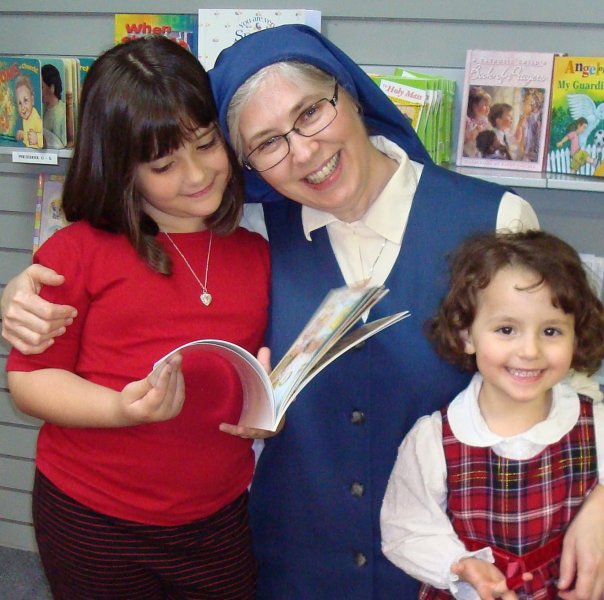Summer Reading
Over the past five weeks I've been able to read (or finish) reading a wonderful little stack of books, and get started on a whole new stack. (When I was in the playpen, my parents told me, "Books are our friends," and I believed them!)
Have you read any of these? What's on your bookshelf?
Currently reading:
Have you read any of these? What's on your bookshelf?
- Inhabiting the Cruciform God (Michael Gorman): A terrific study of what Gorman believes is Paul's central "narrative" and the pattern of our life in Christ. You need some background in Scripture to follow him, though. (Sr. Julia has written and spoken at length about Gorman's fabulous "Cruciformity," which is a longer and less intensely scholarly presentation of the same concept.)
- Facing the Dragon: Confronting Personal and Spiritual Grandiosity (Robert L. Moore): a Jungian Christian analyst looks at the spiritual life and what the fathers would simply call the sin of pride. (I read this on retreat and it's full of bookmarks for me to go over with Jesus during the year.)
- Thank God Ahead of Time: The Life and Spirituality of Solanus Casey (Michael Crosby, OFM Cap). I had heard about Fr. Casey, but this is the first I've ever read of his life. This book, too, now features a number of bookmarked spots for leisurely rereading.
- Musicophilia (Oliver Sacks). Subtitle is "Tales of Music and the Brain." Need I say more? (Sr. Barbara has the copy now. Our provincial, Sr. Margaret Timothy, borrowed it while I was in Boston.)
- Hiking the Camino: 500 Miles with Jesus (Fr. Dave Pivonka): Since I visited Campostela in 2006 (thanks again, Karen!), and cannot reasonably ever expect to make the whole Camino, I have enjoyed doing the Camino vicariously through the new of books that have been coming out by Catholic caministas like Joyce Rupp ("Walk in a Leisurely Manner") and others. Fr. Pivonka's book would be a terrific catechetical companion for the pilgrimage, because he relates the various aspects of camino life to dimensions of faith and spirituality.
- Play: How It Shapes the Brain, Opens the Imagination, and Invigorates the Soul (Stuart Brown). This is by one of those business gurus who goes around helping corporations loosen up and get their creative juices back. Brown is actually a psychologist who did years and years of study on the importance of play and how vital it is in shaping the brain and keeping us functioning as human beings. Play keeps us young! If we forget how to play, we also forget how to adapt to new or unexpected circumstances. We get stuck. We might even die. (Sr. Julia has this one right now.)
- A Whole New Mind: Why Right-brainers Will Rule the Future (Daniel Pink). Another business guru book (he even cites some of the same stories and quotes as Brown in "Play"!); kind of the same idea as Brown's book, but covering six dimensions of "right-brain" activity with practical suggestions for exercising that muscle. (Sr. Maria Kim is now reading this one. I hope I get it back some day.)
- Franz Jagerstatter: Letters and Writings from Prison. This Austrian farmer gave himself so wholeheartedly to the Gospel that he could not justify any cooperation with the Nazi government, not even hospital service (because he could not, in conscience, make the oath of loyalty to the party). What is remarkable about these writings is not that the writings are remarkable (although there are a couple of striking insights), but how this ordinary man found in such remarkable meaning in what sound like Catholic commonplaces: reason enough to stand up alone against the Third Reich.
- The Cult of Saint Thecla: A Tradition of Women's Piety in Late Antiquity (Stephen J. Davis): This is a kind of archaology book focusing on the early devotion to St. Thecla, especially in the Egyptian church from around the 300's to the 500's. Amazing. Especially the Coptic footnotes.
- Apollos: Paul's Partner or Rival? (Patrick J. Hartin): Another kind of scholarly book, but at 1/8 of an inch thick, it's no tome! This is a sociological approach to that eloquent evangelizer whom we meet in Acts 18 and hear about in 1 Corinthians. What do studies of ancient civilization have to teach us about Apollos' upbringing, expectations and method of evangelization? What do these same studies tell us about the relationships among Paul, Apollos and the Corinthians? (This little book is part of a series, "Paul's Social Network"; I'm waiting with baited breath for the volume on Prisca and Aquila, the dynamic duo of the New Testament.)
Currently reading:
- The Stuff of Thought: Language as a Window into Human Nature (Steven Pinker). I am only on Chapter 2 of this investigation into how language works, how we learn it and use it, and what that implies.
- In the Steps of St. Paul (H.V. Morton). Turns out this is a classic, first published in 1936. It came into my hands in Philadelphia when Sr. Cynthia (or maybe it was Sr. Barbara?) found it in the community library. Nondescript black cloth cover, pages mottled with age, it looked like a candidate for the dustbin, but the sister thought I'd be interested. I was. I am. It's a delightfully engaging travel book from a lost era, written in an equally delightful (and equally lost) style.
- Jesus of Nazareth (Benedict XVI). I confess I only opened this book a week ago. I have been so intimidated by what Time (or was it US News?) called the Pope's "stratospheric intellect" that I kept this amazingly lovely and readable text at arms length since its release! Don't make the same mistake I did. "Take and read."







